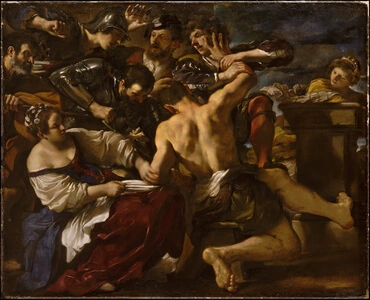1
A palavra do Senhor, que veio a Oséias, filho de Beeri, nos dias de Uzias, Jotão, Acaz e Ezequias, reis de Judá, e nos dias de Jeroboão, filho de Joás, rei de Israel.
2
Quando o Senhor falou no princípio por Oséias, disse o Senhor a Oséias: Vai, toma por esposa uma mulher de prostituições, e filhos de prostituição; porque a terra se prostituiu, apartando-se do Senhor.
3
Ele se foi, pois, e tomou a Gomer, filha de Diblaim; e ela concebeu, e lhe deu um filho.
4
E disse-lhe o Senhor: Põe-lhe o nome de Jizreel; porque daqui a pouco visitarei o sangue de Jizreel sobre a casa de Jeú, e farei cessar o reino da casa de Israel.
5
E naquele dia quebrarei o arco de Israel no vale de Jizreel.
6
E tornou ela a conceber, e deu à luz uma filha. E o Senhor disse a Oséias: Põe-lhe o nome de Lo-Ruama; porque não tornarei mais a compadecer-me da casa de Israel, nem a perdoar-lhe de maneira alguma.
7
Mas da casa se Judá me compadecerei, e os salvarei pelo Senhor seu Deus, pois não os salvarei pelo arco, nem pela espada, nem pela guerra, nem pelos cavalos, nem pelos cavaleiros.
8
Ora depois de haver desmamado a Lo-Ruama, concebeu e deu à luz um filho.
9
E o Senhor disse: Põe-lhe o nome de Lo-Ami; porque vós não sois meu povo, nem sou eu vosso Deus.
10
Todavia o número dos filhos de Israel será como a areia do mar, que não pode ser medida nem contada; e no lugar onde se lhes dizia: Vós não sois meu povo, se lhes dirá: Vós sois os filhos do Deus vivo.
11
E os filhos de Judá e os filhos de Israel juntos se congregarão, e constituirão sobre si uma só cabeça, e subirão da terra; pois grande será o dia de Jizreel.







